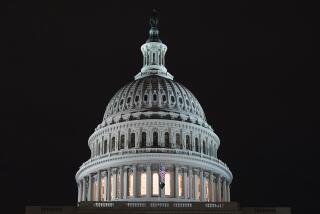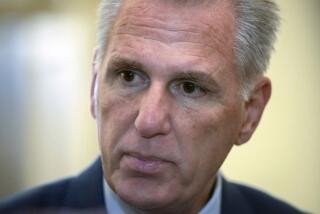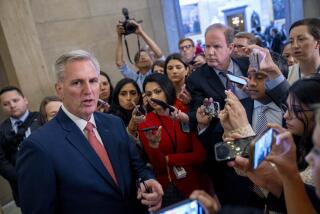Boehner, Obama talk ‘fiscal cliff’ at White House
WASHINGTON -- After days of theatrics and threats from both sides, President Obama met privately with House Speaker John A. Boehner at the White House on Sunday afternoon as the two principal negotiators stepped up discussions aimed at crafting an agreement to thwart a looming budget showdown.
Little more than three weeks remain before the nation could face widespread tax increases and massive spending reductions if they cannot produce a deal.
“This afternoon, the president and Speaker Boehner met at the White House to discuss efforts to resolve the fiscal cliff,” said Michael Steel, a spokesman for the Ohio Republican. He provided no details, but added that “lines of communication remain open.”
A White House official also declined to share details of the meeting. But it was the clearest sign yet that after a week of public posturing and dire warnings intended to sway public opinion, the private negotiations may be producing progress.
PHOTOS: The best shots from the 2012 campaign
Obama and his allies on Capitol Hill increasingly believe they have the stronger hand over congressional Republicans in their effort to push up marginal tax rates for high-income earners.
Polls indicate the public largely agrees with the president’s assertion that income tax rates for households earning more than $250,000 a year should rise to 39.6% from 35%, as they are scheduled to do in the new year. Some key congressional Republicans have indicated the November election results left them with little leverage to stop a tax rate hike. Democrats widened their majority in the Senate and picked up seats in the GOP-controlled House.
Boehner, of Ohio, continues to press for deep spending reductions, including cuts to Medicare, Social Security and other widely popular programs, and he has said he is prepared to increase revenue by changing the tax code to lower deductions, not by raising taxes. The speaker has proposed a two-part framework that would push some decisions onto the new Congress next year.
The secretive talks Sunday occurred after a week in which Obama held several campaign-style public events aimed at highlighting the White House argument that Republicans risk damaging a fragile but recovering economy by refusing to meet his demands for higher taxes for the wealthy. The president will continue the effort Monday with a trip to the Daimler Detroit Diesel plant in Redford, Mich.
If no agreement is reached, virtually all the tax cuts passed under the George W. Bush administration would expire on Dec. 31, resulting in a $2,200 tax hike for an average family of four next year.
Economists warn that those broad tax increases, along with across-the-board deep spending cuts for virtually every government program and department, could cause the economy to contract sharply and send the nation into another recession.
Congress is expected to resume on Monday, and Republicans who control the House have changed their calendar to remain in session an additional week before the holidays as both sides try to craft a deal.
House Minority Leader Nancy Pelosi (D-San Francisco) joined Obama at the White House for a one-on-one talk Friday that lasted 40 minutes. An aide to the Democratic leader characterized it as a “good meeting.”
Obama has also been in regular telephone contact with Senate Majority Leader Harry Reid (D-Nev.), who would be instrumental in any deal with the Democratic-controlled Senate.
Republicans have sought to shift blame for the standoff onto the White House, complaining that the president is spending more time campaigning than negotiating.
“Ask the president to come off the campaign trail,” Rep. Kevin McCarthy (R-Bakersfield), the majority whip, said on “Meet the Press” Sunday. “Tomorrow he’s going to Detroit. It’s now time to govern. The election is over.”
But Democrats insist Republicans have little choice but to compromise with the White House, or risk raising taxes on ordinary Americans.
“The American people spoke on this issue in the election,” said Sen. Richard J. Durbin of Illinois, the No. 2 Democrat, on “Meet the Press.” “I’d say to Speaker Boehner and Congressman McCarthy, listen to what the American people said in the election; listen to the fact that two out of three Americans believe that the wealthiest should pay a little more; and listen to your own caucus.”
Follow Politics Now on Twitter and Facebook
kathleen.hennessey@latimes.com
Twitter: @lisamascaroindc, @khennessey








